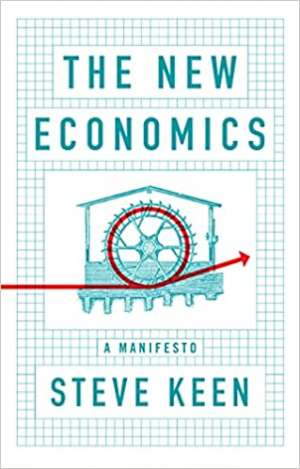28 March 2022
The New Economics
A Manifesto
Steve Keen
2022, Polity, 210 pages,
ISBN 9781509545292
Reviewer: Kevin Gardiner, Rothschild & Co/Cardiff Capital Region Econ Growth Partnership

Steve Keen is a senior academic at UCL and a long-standing advocate of heterodox economic analysis. In this short and engaging book he explains why he thinks a “manifesto” is needed, arguing that conventional (“neoclassical”) analysis is flawed on many counts.
In particular, he questions the mainstream’s treatment of money and the environment; its fascination with equilibrium; and the lack of interest in epistemology. He finishes by urging readers to “Be the change”, and offers some thoughts on how they might start to do that.
I cheered him on at several points. Money is excluded or misunderstood in many mainstream models, and it was refreshing to see him citing approvingly (p24) a 2014 Bank of England article stating bluntly (at last) that “bank lending creates deposits”.
I agree that the complexity, endogeneity and dynamism of the economic system cannot be captured by a worldview that focuses on the instantaneous replacement of one static solution (of implausibly simultaneous equations) with another. His criticism of Friedman’s notorious “as if” account of the validity of a theory’s assumptions is bang to rights, as is his characterisation of much mainstream economics as a degenerating research programme. And who could disagree with his advice to would-be economists to study more widely?
He is right to remind us that rising marginal costs are not always the norm. He suggests that “For all its flaws, capitalism was and remains an exciting social system” (p139), but has been reduced by neoclassical study to dullness and vapidity. To be clear, however, he is not an advocate of, or an apologist for, capitalism, but merely seeking an accurate representation of it. He believes inequality has risen dramatically, and environmental tipping points may be close.
Some of his criticisms seem wide of the mark. Establishment economists might argue that the Global Financial Crisis was a failure of prediction, not understanding: market seizure is surely always possible, if not likely? And was the pre-pandemic global economy doing as badly as he suggests?
He overstates his case on money, and he labours the point on debt. He says “We need to reduce private debt back to its levels during that Golden Age…” (p65), but those good old days were much poorer. He seems to believe that borrowing deprives tomorrow’s generations of real resources.
Unfortunately, his proposals, if adopted, might repeat some of today’s mistakes. And despite his iconoclasm, he has far too much respect for the commonplace observations of people writing when ideas were produced under monopolistic conditions, by a small group of privileged suppliers.
Ultimately, he simply wants a better-articulated mathematical model – one centred around complex system dynamics. The hunger for such a model may be the problem.
His criticism of economics as not being scientific enough is a classic case of physics envy. He wants a new paradigm to “be consistent with the fundamental physics known as the Laws of Thermodynamics” (p18). The parallel may not hold, and he seems not to be aware that the understanding of scientific method may have moved on from Kuhn’s work.
In the free world, economies are driven by people. People are emotional. Emotions cannot be modelled. There are income effects, and substitution effects. That’s about it.
So for me, a genuinely “new” economics might be more modest. It might concentrate on eliminating the many logical fallacies (on debt, demography, pensions, competitiveness) from the public debate and refrain from seeking an all-encompassing system or model. And it might occasionally look at what today’s economies produce, and why.
